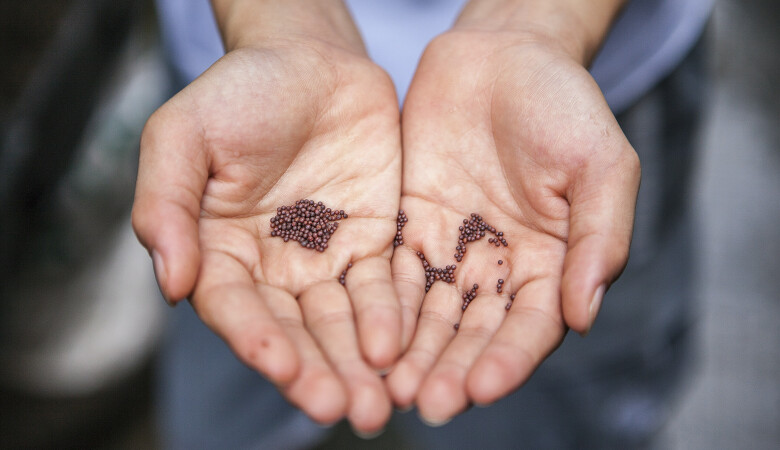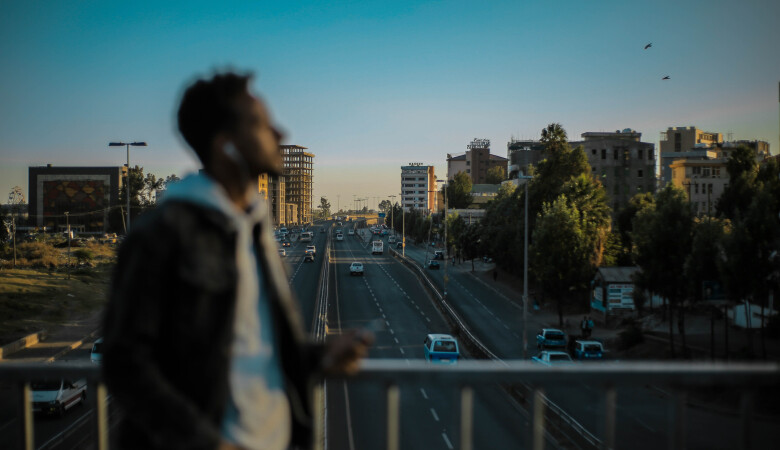Spend Yourself on Behalf of the Needy (Isaiah Sermon 69 of 80)
November 13, 2016 | Andy Davis
Isaiah 58:1-12
Money and Possessions, Forgiveness
Andy Davis preaches a verse by verse expository sermon on Isaiah 58:1-12. The main subject of the sermon is how we can spend our lives to serve the needy in a Christ-honoring manner.
- SERMON TRANSCRIPT -
As I was thinking about Isaiah 58, thinking about this sermon, I'm going to be preaching two sermons on this chapter. There's just too much for me to be able to deal with here. But, I meditated and it became clear and clear as there's a phrase "the chains of injustice" and I thought about chains or bonds, or yokes of oppression, and it occurred to me we live in a world of invisible chains. For many, many months we had the privilege of studying in the Book of Ephesians, and how in Ephesians 2, we're told of a dark Satanic kingdom in which we all once lived. And we were held in the bondage, in the invisible chains of sin, and we couldn't see them. Satan has cleverly crafted a vast network of invisible chains that are effective in accomplishing his evil desires. Chains of injustice yokes of oppression, prisons of sin that we cannot see with the natural eye. They have to be spiritually discerned, we have to be able to see through what we can see with our eyes to see the injustice to see the chains, and to see them rightly the way God does. Now The gospel of Jesus Christ shines heavenly light into that, enables us to see with ever-increasing clarity, the more we grow in Christ, these chains. It enables us ourselves through faith in Christ, to rise up out of a prison of sin, rise up out of chains and walk in newness of life, and then we can be filled with joy and we can have purpose, in our lives.
But you know, for all of that, I still feel strong chains satanic chains on my heart. Do you not feel it on yours? When we are called on in Verse 10 of this chapter, to spend ourselves on behalf of the poor or needy. I feel a reluctance, in my flesh to do that. I feel it all the time. I feel the same thing when I try to share the Gospel, I feel something holding me back. I want to share my faith. I want to be bold, I want to care about the lost around me, but I hold back, something's holding me back. I must feel there's some kind of invisible bondage or chain around my heart that's keeping me from living the kind of righteous life that God wants me to live. And so this text challenges me, friends, it gets in my grill, it bothers me. The phrase, "Spend yourself on behalf of the needy" bothers me, it challenges me because I know I'm not really doing it, not like I should.
In the summer of 1986, I was on my first mission trip and I've told this story before, it has never left me of how for the first time, I saw poverty in another country. And poverty in America, is different than poverty in other countries. It's just not anywhere near as severe. And so now I've seen many, many such scenes but this was my first time. I was riding in an air-conditioned van through the streets of Mombasa, 15 passenger van with other members of my mission team and we were just driving around there and I couldn't believe the scenes that I was seeing. I couldn't believe the degradation of the homes. I couldn't believe the poverty. And Kenya is not really an incredibly poor African nation, but compared to us, it was just, there was just poverty, there. And we were just moving through in a bubble of air conditioned comfort and luxury. And just moving through and just like Julie was sharing her testimony a few minutes ago, I felt like, yeah, I mean there's this comfortable bubble around me, like she was talking about her sheets and all that. Well, that was the air condition van and how the principle of the Gospel, the incarnation principle, is to get out of the van and go be with the suffering people.
I feel that there's something inside me that holds me back from doing that. It's a love of self, it's a love of fleshly comfort and ease that keeps me from living an openly righteous life. I think the only remedy must be the ministry of the Word of God, the Power of the Spirit in my life, for me to see the standard and say, "I'm not living up to this, I'm not living the kind of life that I want to live I'm not spending myself, on behalf of the poor and needy. I don't feel like our church is doing everything we could do in this community to do the same." And so what I really want is for you to have an encounter with God through the text here, this timeless text. So that we would understand mercy ministry. We'd understand the kind of life God's calling us to live and that we might be more righteous in His sight.
But we have to understand it in the context of the Gospel that God's given us here, in the context of true religion, in the context of justification by faith alone, apart from religiosity. We're not going to be saved by our good works, we're not going to be saved by our ministry to the poor, or needy, that is false doctrine. We are saved by simple faith in Jesus Christ.
I. Exposing Hypocrisy and Oppression (vs. 1-5)
And so, right away, the prophet Isiah is calling to the people of Israel, because God is commanding him to do so, to expose their religious hypocrisy, and their wickedness, to expose how religious they are, and how displeasing the whole machine is to him. Look at verse 1 and following, it says there, "Shout it aloud, do not hold back. Raise your voice like a trumpet. Declare to my people their rebellion and to the house of Jacob their sins. For day after day they seek me out; they seem eager to know my ways, as if they were a nation that does what is right and has not forsaken the commands of its God. They ask me for just decisions and seem eager for God to come near them."
So Isaiah here is exposing their hypocrisy, their religiosity here, the wickedness of the Jewish religionists of his day. He's commanding Isaiah to shout aloud and not hold back, to declare to Israel, their sins. He wants them declared and exposed the ministry of the Word of God. That's all. This is what you're doing. I want to speak these words to you. He's saying this to them. Now they were outwardly, obeying the laws of Moses, they were outwardly keeping the laws of religion. But they were actually rebelling against Him at the same time. Now I'm going to talk more about this next week, I'm going to just move ahead in the message. But in Isaiah 29 Verse 13, He says this, "These people come near to me with their lips, but their hearts are far from me, they worship me in vain. Their teachings are just rules taught by men." So their worship, their religion was not pleasing to God. Now, the NIV, I think does a better job than the other translations of giving a sense of how wrong this whole thing is by adding words like, "They seem eager to know my way, they seem like they want me to come." I think actually it's appropriate. That's the feeling here. And yes, it's more like they actually are righteous, they are coming, they are etcetera. But I don't think that's actually what's going on because later in the chapter, He's very negative toward them.
So there seems to be a discrepancy between their religion and how they're living and then what's really going on in their hearts. Verse 2 and 3, "For day after day, they seek me out. They seem eager to know my ways, as if they were a nation, as if they were a nation, that does what is right, and is not forsaken the commands of its God. They ask me for just decisions and seem eager for God to come near them. 'Why have we fasted?' they say, 'and you have not seen it?' Why have we humbled ourselves and you have not noticed?'" So they're going through this religious sham, really. This outward machine, they're just in a ritual, a pattern of animal sacrifice, coming to the temple, doing all these things, the Jewish religion of the old covenant, that's what they were doing.
But it was just a sham, it was hypocrisy. They'd actually forsaken the commands of their God. Look at Verse 3-5, they're actually fasting, while sinning or sinning while fasting. I don't know which. But both were going on. "'Why have we fasted,' they say, 'and you have not seen it? Why have we humbled ourselves, and you have not noticed?' Yet on the day of your fasting, you do as you please and exploit all your workers. Your fasting ends in quarreling and strife, and in striking each other with wicked fists. You cannot fast as you do today and expect your voice to be heard on high. Is this the kind of fast I have chosen, only a day for a man to humble himself? Is it only for bowing one's head like a reed and for lying on sackcloth and ashes? Is that what you call a fast, a day acceptable to the LORD?"
Well first notice their attitude, "Why have we fasted Oh God and you have not seen it? Why have we done this religion and you've not noticed?" They seem to think that depriving themselves of a little nourishment for 12 hours or something like that, puts God in some kind of debtor's position in reference to them, as if He owed them something. Clearly they have forgotten the exalted Holiness of God that their forefather, Abraham, clearly had in mind as he was interceding for Sodom and Gomorrah, remember that? In Genesis 18, and he approached and he said, "Oh, would you please just hear me though I am dust and ashes." There's that broken humility or even just the previous chapter, Isaiah 57:15 that we looked at last week in depth.
God is Not a Vending Machine
Isaiah 57:15, "This is what the high and lofty one says, He who lives forever and whose name is Holy, 'I live in a high and holy place but also with him who is humble and contrite in spirit, to revive the spirit of the humble, and revive the heart of the contrite.'" So, they've forgotten all that. That's not how they're coming, they're actually coming somewhat angry at God, they're uppity toward God, they feel like there's some injustice Heaven to Earth here. Also how did they know that God hadn't heard. They said, "Why have we fasted and you've not heard, why have we prayed, you've not answered." So there must be some specific measurable thing they were looking for. I don't know what this could be, but they just know that God's not heard, He has not answered them. So, I imagine in the old covenant era, there probably was some agricultural issue there. There probably was a drought leading to a famine of some sort. God said He would do this kind of thing. Maybe there was some kind of locust infestation or some other thing was going on, but there was something that was causing them trouble and making them come and fast and pray. But the problem had not been solved There was no rain, I think they figured 12 hours of fasting, check. Now, the rain should come, right? As though God is some kind of vending machine.
Have you ever done that? Have you ever put coins in a vending machine and not got what you are looking for? I know you, it has happened right here, in this building, and I feel right down there. I feel a sense of injustice. I have put 50 cents in the machine and I should get my Coke out or Diet Coke, that's what I should get, but it has not happened now. There's injustice. I'm owed something here. I get that same feeling here. Do you not get that? This sense, I have put in the time now, on my religion stuff. There should be something coming back, that I could measure. I should know that you heard me. But can I tell you the God of Isaiah 57:15, the God who is high and lofty, whose name is holy, the God who inhabits eternity, will never be any man or woman's debtor ever. He will never owe you anything, never. Romans 11:35, "Who has ever given to God, that God should repay Him. For from him, and through him, and to him, are all things. To Him be the glory forever!" God's never going to owe you anything, ever. And actually God [chuckle] somewhat minimizes their piety her, do you see it? It's like kind of low level, it's like below average.
Look at Verse 5, "Is this the kind of fast I have chosen, only a day for a man to humble himself? Is it only for bowing one's head like a reed and for lying on sackcloth and ashes? Is that what you call a fast, a day acceptable to the LORD?" Now, if we have sinned, we have done something that violates God's holy law, and God is disciplining us by sending us the equivalent of a drought, and a famine. He does not owe it to us to remove the drought and famine. He's never going to as anything, no matter what we do with fasting and prayer, He'll never be in our debt ever. It's just mercy, and grace. But actually even worse these people are actually adding sin upon sin in their religion. Look what He said about what their days of fasting and prayer were like. "Yet on the day of your fasting, you do as you please, and exploit all your workers, your fasting ends and quarreling and strife and striking each other with wicked fists. You cannot fast as you do today and expect your voice to be heard on high." So these are issues of social injustice. That's what's going on.
God is clearly judging people of power and influence, people who have workers who are serving them. But there are also issues of just personal godliness person-to-person. They would get a little hungry I think, and get irritable. I really think that's literally what's happening here. They would fast for a while, they would get irritable and they would start having fights, with each other and it might actually end up in a brawl. Like, "If I can just tell you", says the Lord, "this is not acceptable to me, this is not a fast, this is not piety, it's not godliness, you're actually beating each other up. You cannot fast as you do today and expect your voice to be heard on high." Now, let me just bring it right here to us 21st century American Evangelical church. This is a clear and present danger for us as well. Every generation is tempted to trust in their own religiosity, their own acts of righteousness to put God in some kind of debtor's position that He should do what you think He should do. Everyone's tempted in that way. We Baptists, we think that because we've been baptized, we've joined a church, we attend pretty faithfully or even just occasionally, but we do attend, that God should be happy to have us. He's lucky to have me. I don't think we'd ever a voice it like that, but it feels that way.
Oh, we think that because we bow in prayer for grace before a meal, or we even have a daily quiet time, or because we read through the Bible in a year, or memorize Scripture, or do some other acts of piety, that we have the same kind of attitude. We also might make a few sacrifices in our lives, we might give some money, might write a cheque to something, and we expect God instantly, to answer our prayers. And then we actually like me and the vending machine, I didn't get too angry, but I was irritated. Alright? But there's an irritation toward God. I have prayed and you've not answered my prayer. Beware, beware of this kind of trust in religion, beware of trusting in your habits and patterns and religious machinery, in your church attendance, and putting up with sermons once a week and sacrificing sleeping in on Sunday mornings. Remember the lesson of the Gospel. We have been trained in the Gospel. In the Book of Galatians, we are told that we are justified by faith in Christ Jesus alone, because by the works of the law shall no one be justified.
We are not made right with God by our good works, we are made right, we sinners, we broken, unjust, wicked sinners, we are made right with God, simply by faith, in Jesus. Possibly you've come into this church building this morning looking for answers maybe after the election, may be a friend invited you, but you know you're outside of Christ, you're not claiming to be a Christian, you just here today. Can I just tell you the good news, of the gospel is that all of your sins can be forgiven by simple act of faith on your part, turning away from wickedness and sin, saying "I'm a sinner, I know I deserve condemnation, but Jesus died for me, He died on the cross for me, and He rose from the dead, that I might live a new life, I want Jesus." If you can say that to Him in your heart, trusting in Him, alone, then you will be forgiven, all of your sins will be wiped away. You need to know that before we get into the social justice issue that I'm about to talk about, because there's such a temptation for Americans, for people all over the world to feel good because they care for the poor and needy. You can't use your service to the poor and needy to pay for your sins, only by the Gospel.
II. The True “Fast”: Generous Justice (vs. 6-12)
Now I'm going to talk more about going through the motions in religion next week, but let's just dive in out at 6-12, Verses 6-12. What is the true fast? What is the true religion? God's calling on us to do? Look at Verses 6 and 7, "Is not this the kind of fasting I have chosen to loose the chains of injustice and untie the cords of the yoke to set the oppressed free, and to break every yoke? Is it not to share your food with the hungry and provide the poor wanderer, with shelter, when you see the naked to clothe them and not to turn away from your own flesh and blood?" God is redefining religion here. He's causing them to turn away from their own selfishness to minister to their neighbors to the hurting among their communities in the name of their relationship with God, that's what He's calling that's true fasting, according to me.
And He calls it a fast I think because they are learning to deny themselves. The reason I didn't want to get out of the air conditioned van is, because I didn't want to. The reason I don't want to care more for the poor and needy, is because it's costly to me. It affects my lifestyle. So the fast God's calling on us affluent people to make is to deny levels of comfort so we can care for others. That's the fast He's calling on us. It's an energetic thing, it's not bowing your head like a reed and lying on a mat, it's actually very energetic, it's bold and energetic and filled with activity, but it's a fast. And God says He's actually chosen this kind of fast to honor Him.
He begins in verse 6 by talking about breaking the chains of oppression, to loose the chains of injustice and untie the cords of the yoke. Societal injustice is, as I said at the beginning of the message, difficult to discern. Like the old statement, "Does a fish know it's wet?" Do we unjust people know when we're being unjust? It's hard to know. So, we need to be able to get out of ourselves and say, "I accept the basic premise that I am a sinner, depraved, only saved by grace. Alright, show me my injustice, show me the ways." And not just me, but the ways other citizens here, people in this community are being unjust to their neighbors. Show it to me. Now, these hidden chains slip around people and they guarantee poverty. They guarantee a difficult life. Laborers are working and they're not receiving wages like they should, they're downtrodden, but they can't get a fair hearing from the judge, because the judge won't even entertain their case. Isaiah 1:23, "Your rulers are rebels, companions of thieves. They all love bribes and chase after gifts. They do not defend the cause of the fatherless, the widow's case doesn't even come before them."
So, how is there social injustice in our day? Now, I have thought about this more and more over the last year or two. I preach sermons on racism, I've talked about issues that are really heavy on my heart. I thought about what kinds of institutional injustices are there right here in Durham? Show them to me. What's going on in my heart? How can we get involved in cycles of poverty and ignorance and sin, and see the truth of the gospel break all that apart? To see chains broken apart, to actually see that happen. That's what I want to see happen here in Durham, because we're here. I want the community to be different because first, Durham is a church here, in the name of Jesus. It's what I want to see happen. So I think about the police issues, been thinking about it and it's still on my mind. But I was at Logan Airport about a month ago, and there's an African-American young man there, had a hat on. He's a cool-looking guy and he was humming Jazz music as we're standing there in line, I was like, "I want to talk to this guy." I love sharing the gospel in airplanes and airports. I just love doing it because they're a captive audience, they need to stay near their gate and then when they're sitting next to me, that's even more true. That is so cool.
This young guy, he was from New Orleans, turned out he was a believer. He comes from a Baptist background, his parents are involved in church leadership. But he's a jazz pianist. So I was talking about the police issues, the Colin Kaepernick, NFL thing, different things. He said, "Yeah, it bothers me." He said, "But you know what bothers me too, I grew up in the streets in New Orleans. It bothers me to see a black dude kill another black dude 'cause he stepped on his shoes." So I'm just telling you friends, there is injustice everywhere. It's in our hearts. There's no one group that's free from it, so that if that group were in charge, there would be no more injustice. We are all sons and daughters of Adam, and we need to be delivered. I think the greatest injustice in our country right now, I've said it before, I'll say it again, is abortion. I think it's wrong for the strong to not protect the weak. But before that, I think it's wrong for a young man to impregnate a woman and then walk away from his responsibilities, leaving her a very young single mother to fend for herself and her child in a low-paying job, just about guaranteeing a lifetime of poverty. I think that's wrong too.
I feel like we could shed some light in that, the light of the gospel. I think we could get some young men early and teach them what it means to honor a woman, and what sexual purity looks like, and what the gospel calls on us to do, and what it looks like to be a husband and a father. And just the church can be the light of the gospel right here in this community. I've got friends that are planting a church in a very underprivileged hard area of Washington DC, and they've partnered with the government school right near their church to try to help it, and it's just a tragic scene. In the last 22 years, that government school has had 24 principals. Just think about that. Nobody wants that job. And the committee, the government committee there, they allot extra money to attract teachers to the school with promises that they'll pay your school loans as a teacher so that you'll even come and work there. They can't hold on to any good teachers. What would it be like to grow up as a child in that community and be educated at that school? What's that like? So that church wants to make a difference in that school and find a way to bring the light of the gospel there.
For me, perhaps a leading evangelical thinker on issues of social justice is Tim Keller. He's written a book called Generous Justice. It's available out here in the North Tower Resource Center, you can order it. It's very helpful, very practical. I was thinking about the issue of justice, and I realized it wasn't helpful for me thinking about justice to think first and foremost vertically toward God. That would be a sinner saying to God, "I only want justice from you, give me what I truly deserve." Friends, none of us wants that, you know what I mean? We deserve hell. We deserve condemnation. That's not what the prophets mean by justice, I think. Horizontally we're not in a position of mediating or ministering hell to other people. I really think the best way to look at justice the way that the prophets meant is the second great command, "Love your neighbor as yourself." Whatever God means for you to do in any certain situation you are to do, that is the justice you owe to your neighbor there. But it's even more significant if you are in a position of authority and power and you're dealing with people who are vulnerable, people who need protection.
So horizontally, justice for me, doing justice means to care for others, to love them as I love myself, but especially to protect and provide for those most vulnerable in society. There's four people that are mentioned again and again in the Old Testament prophets as vulnerable in society, they are widows, orphans, the aliens, and the poor; those four are the most vulnerable and they need therefore to be protected. So what that means is, for us we have to use whatever power we have, whatever influence we have, whatever positions we have in this community to protect those that are vulnerable, that's what we're called on to do. Those that don't have a voice.
Now none of us finds this easy. These issues are complex. I don't know always what it means to loose the chains of injustice. I want to start with this. In 2013 I preached at the Cross Conference and we had a conference slogan that we, we Christians, care about all suffering, but especially eternal suffering. What would it profit someone if they should gain the whole world and lose their soul? So we want to be sure that we're going to break the chains of sin and eternal condemnation through a proclamation of the gospel. But what I believe is that the two are not in contradiction with each other, they actually are in great harmony. As we step out and spend ourselves on behalf of the poor and needy, we're going to find more and more opportunities to share the gospel. More and more opportunities to talk to people about what we really love, what we're living for, why we're doing this. To show generous justice in a lavish sort of way.
Tim Keller gives a lot of examples in his book and I'll just pick a couple, one is a woman named Heather who's a highly-educated lawyer who gave up a lucrative position in a corporate law firm to become an assistant DA in New York where so many of the criminals she prosecutes have been exploiting the poor, particularly poor women, so she's able to use her legal acumen to come in there and break that chain of injustice legally. But she did it at sacrifice, she spent herself on behalf of the poor to do that, she could make a lot more money in a corporate law firm. Or another example Keller gives is of a young man he knew in seminary named Mark Gornik who moved with his wife years ago to Sandtown, one of the poorest and most dangerous neighborhoods in Baltimore, Maryland. For decades white people had been fleeing Sandtown, living at other places, he was the first to move back long before there was any gentrification or any appeal, it was just a dangerous place to live.
Keller said this about Mark Gornik, Mark Gornik said, he said, "The police all thought I was a drug dealer and the drug dealers all thought I was a police officer. So for a long time I didn't know who was going to shoot me." But now, partnering with other church leaders and other people in the community they planted a church and they have a flourishing ministry with all kinds of creative ways of addressing the needs of the community in the name of Jesus. So Heather and Mark and others like them are willing to spend themselves on behalf of the needy. They lay it out for generous justice, feeding the hungry, housing the homeless. Look at verse 7, "Is it not to share your food with the hungry and provide the poor wanderer with shelter? When you see the naked to clothe them and," listen to this, "not to turn away from your own flesh and blood." That turning away, that's the enemy, that's what's going on.
Remember the story of the good Samaritan and the road to Jericho and you got the priest and the Levite, we know they're the bad guys in the story. But they cross on the other side, they don't want to get involved, they don't want to look at it, they don't want to get close to this bleeding guy by the side of the road, the priest and the Levite, they're very religious, but they're just on the other side of the road. That's the turning away.
Now the true sacrifice, as I've been saying, is verse 10, look at it again. It says, "If you spend yourself in behalf of the hungry and satisfy the needs of the oppressed, then your light will rise in the darkness and your night will become like noonday." This is the real challenge, isn't it? It's easy to write a check, it's easy to do little things. This text is calling on you to be all-in, to invest yourself in some pattern of ministry. I don't know what it is, because everybody's called in different directions, you're going to be called in different directions than somebody's sitting right next to you in the pew. But you have to do something. There has to be some pattern of sacrifice going on in your life or you're disobeying the spirit of the text.
So, I think spend yourself on behalf of the poor looks exactly like Matthew 16:24 and 25, Jesus said, "If anyone would come after me, he must," What? "deny himself and take up his cross and follow me. For whoever wants to save his life will lose it but whoever loses his life for my sake and for the gospel will find it for eternity." I think that's what it means to spend yourself. Like, lose yourself to find yourself.
Now I think this becomes much more practical, much easier, if you start to get to know people on the fringe personally. If you actually draw close, get out of the air-conditioned van, draw close, there's this gap between us and the poor that affluence has set up. For us to cross that gap and actually make friends and make connections with people who are struggling. John Wesley did this, he went to a debtors' prison. And we don't have them now but there was a debtors' prison, and back in England in those days if you owed X amount, you're thrown in prison until you should repay the debt. Well, do you not see a practical problem there? I mean, they didn't have work release programs for which you got paid a salary back then, you were just in there. So there was no answer there. You might owe a couple of copper coins that were jangling in John Wesley's pocket as he walked in there. That idea hit him, "Wait a minute, I could set you free right now with this money I have in my pocket." Once that thought hit him he said, "I never looked on money the same way again the rest of my life." Because he got close to somebody who was hurting. He looked them in the eyes.
William Ruffner, Pastor of Seventh Presbyterian Church in Philadelphia, 1853, wrote these words: "To cast a contribution into the box brought to the hand or to attend committee meetings are very trifling exercises of Christian self-denial and devotion. Compared with what is demanded in long, weary walks through the street, the contact with filth and often with rude and repulsive people, the facing of disease and distress, and all manner of heart-rending and heart-frightening scenes. And all the trials of faith, patience and hope, which are incident to the duty we are urging." In other words, he didn't mean this, but get out of the air-conditioned van and go walk the streets. Get to know people and you will be more generous. I think that's what Keller is saying, I think that's what the text is saying, spend yourself means invest, connect, relate. If you say, "Look, I don't want to just give money because they're going to use it for drugs." Well, fine. Then don't just give money, give yourself, give something more, get to know people that you could find yourself partnering with and connecting with and helping.
Now, Keller gives a theology that's called the theology of Shalom, a deep, rich, full relationship, and this is what he wrote. It's very powerful for me. I want you to follow this image. "The wedding together of God, humans and all creations in equity, fulfillment, and delight. This is what the Hebrew prophets called Shalom." We just translate it peace, but in the Bible, Shalom means a universal flourishing, a wholeness and delight. It describes a rich state of affairs in which natural needs are satisfied and natural gifts are faithfully and fruitfully employed all under the arch of God's love. Now here's an illustration of Shalom. If I threw a thousand different colored threads onto a table they wouldn't become a fabric, they would just be threads laying on top of each other. Threads become a fabric when each one has been woven in and under, around and through every other one. The more interdependent they are, the more beautiful they become; the more interwoven they are, the stronger and warmer they become. God made the world with billions of entities, but He didn't make them to be an aggregation, rather He made them to be in a beautiful, harmonious, knitted, webbed interdependent relationship with each other.
So physically when your body's working properly, every part works with all the others, but if you have a cancerous tumor, it means that a part of your body's at odds with all the rest. You experience the unraveling of physical Shalom. Psychologically your inner psyche has various parts: Thoughts, feelings, and reason. When they're all working together, you experience inner Shalom, peace. But when your feelings crave something that troubles your conscience, then there's a dissonance; you experience guilt, which means you experience the unraveling of psychological Shalom. Financially when people, some people have money and resources and advantages, when they then plunge them into the human community, so the parks are great, the schools are great, the houses are great, you have a strong social fabric, you experience social Shalom. But when the wealthy ignore the less fortunate, when they hold on to everything, the social fabric unravels.
Now, note in the text that justice is depicted as sharing food with the hungry. This literally means to wait on the hungry, that's literally what it says. Not just giving money so somebody else can serve the food, it's literally to serve the food for yourself. That's what it means to do justice. So it means "taking the threads of your life and weaving them up with the threads of other people's lives."
So Keller talks about the educational system in New York and in cities like Washington DC and all that. Children are growing up in communities where given their family circumstances and their school situation, they are functionally illiterate. By the time they're 15, 16, 17 years old, they effectively can't read or write. When you get to that age and you can't read or write you're ruined for the market, you're ruined when it comes to economic and social flourishing, you're locked into poverty probably for the rest of your life, and that's happening to hundreds of thousands of people in New York City right now, says Keller. Why is it happening?
Now, here's the thing. The liberal, politically liberal analysis says it's because of unjust social structures. The conservative, the political conservative analysis says it's because of the breakdown of the family, but neither side ever says it's the kids' fault. No one's blaming the 7 and 8-year-olds. Thank God. No one's saying the 7-year-old needs to say, "Hey, I need to move to a better school district." No 7 or 8-year-old's supposed to think, "My parents are guilty of injustice toward me and malpractice." They're not thinking that, they just go where they go and yet, "A child born into my family," says Tim Keller, "has a 300 to 400 times greater chance for economic and social flourishing than the kids in those neighborhoods." That's just one way in which the fabric of this world is tattered and torn and ripped.
So the Lord, through this text, is calling on us to spend ourselves on behalf of the poor and needy. And if we do, we are going to have an amazing platform for the gospel. People are going to want to know, "What is it that motivates us? Why are you doing this?" And they're going to ask and we're going to say, "Hey, I want to alleviate this suffering that we're talking right now, but I want to alleviate far greater suffering than that. Can we talk about what Jesus came to do and how He came to save souls, like yours and mine?" It's going to happen, it's going to happen.
The Lavish Rewards of Serving the Needy (vs. 8-12)
Look at the rewards, and we'll finish with that before we go to Lord's supper. Verses 8 through 10, "Then your light will break forth like the dawn and your healing will quickly appear. Then your righteousness will go before you, and the glory of the Lord will be your rear guard. Then you will call and the Lord will answer. You will cry for help. And he will say, 'Here am I.' If you do away with the yoke of oppression, with the pointing finger and malicious talk, and if you spend yourselves on behalf of the hungry and satisfy the needs of the oppressed, then your light will rise in the darkness and your night will become like the noon day."
I just can't help but read that in light of the gospel. If we do this, we are going to be a light shining radiantly in a very dark place. People are going to say, "Tell me more about that light." Jesus is the light of the world. We're going to have opportunities to do that, and I'm looking forward to that. Look at the rich spiritual prosperity, verse 11 and 12, "The Lord will guide you always. He will satisfy your needs in a sun-scorched land, and He will strengthen your frame, your bones. You'll be like a well-watered garden like a spring whose waters never fail. And your people will rebuild the ancient ruins and raise up the age old foundations and you will be called repairer of broken walls, restorer of streets with dwellings."
III. Applications
Application first, come to Christ. I said at the beginning, I say it here at the end. This kind of mercy ministry will never save a single soul, never. You could do a thousand hours of community service and be even more sinful before because you didn't do it in the name of Christ for the glory of God. We can never use our good deeds to pay for sins. Come to Christ, come to Christ, trust in Him. Now, if you already were Christian before you came here, I guess I would start with just understand generous justice. What does it mean for you to live a life of justice? What does that mean to spend yourself on behalf of the needy? Ask yourself this question. This is just a one application question I want to press on you. Ask yourself this question, "How am I spending myself on behalf of the poor?" Just ask that, it's a simple question. "What principle of sacrifice is going on in my life for the poor?" There needs to be some answer. I would say definitely you don't all need to have the same answer, but there needs to be some answer in your life.
Now, there are some people in our church that are moving to the community, like Mark Gornik did, and they're going to seek opportunities to do that. I think it would have been good for us to do that before gentrification and property values became $400,000 for this house or that house. But there may be still some bargains to be found or maybe some people are wealthy enough to do it, but there are other parts of our community we can be moving in and influence, but you don't have to move in to do it. There are folks that go out on Wednesdays and interact, as I said, with young African-American kids. Boys from our community, they play sports with them, they do Bible studies with them, and they talk to them about sexual purity, they talk to them about manhood. Praise God! Get involved in that.
Our international connections ministry does ESL classes, English as second language classes. It's a tremendous ministry. Nathan Ma is doing ministry with refugees. We're talking right before worship today, he said, "Probably in light of this election it's going to be even harder for refugees in our country. You know what that means? Even greater opportunity for the gospel." Find out from Nathan Ma. If you want to get involved in refugee ministry, that is loosing the change of injustice. Find out ways that you can be involved in that. Find some way to be sacrificially involved.
Now what I'm going to do is I'm going to close this time in prayer, and then we're going to go to the Lord's Supper. The Lord's Supper is an ordinance that we do regularly. We're excited to do it. We expect, as believers in Christ, we should expect, to have an encounter with the living God through this ordinance. We do not believe that the bread and the juice become the actual literal body and blood of Christ, but we believe that by partaking, by eating and drinking, we are spiritually drawing close to Christ and we're mindful of his death for us, his resurrection. We're mindful of the future when he comes again. We're mindful of our accountability to him. Now, this is for those that have put their trust in Jesus Christ as Lord and Savior, and testified to that by water baptism. If you have not yet done that, then first do that, and then next time we'd love you to partake. But we'd ask you to refrain if you've not yet done that, so close with me now in prayer.































